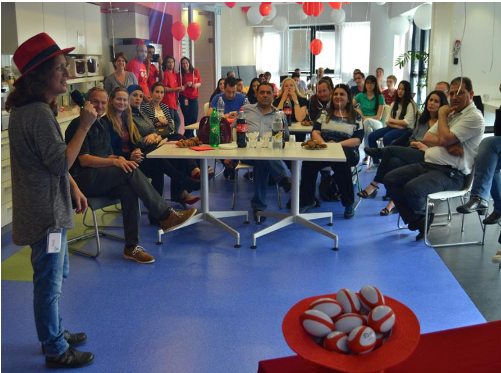
This project was the brainchild of several community contributors. Doron Bachar, chairman of the Volunteer Department for the city of Ra’anana, contacted Miki Kenneth, Director of Software Engineering in Israel (located in Ra’anana), to create a volunteer program to inquire if Red Hat would be interested in creating a program to bring the two communities together. She knew that for Red Hat to get involved the program had to meet the following objectives:
- It must be open source.
- It must combine an easy programming language and an introduction to the Linux operating system.
This is the first volunteer project conducted in Israel in which Red Hat volunteers had weekly contact with kids from both an Arab village and an Israeli city.
Program details
Eli Masika, a senior software engineer at Red Hat, led the project. He designed a program in which:
- Girls and boys from both locations would work together
- Students would learn about Linux, open source, and the Python programming language
- They would have fun

Sample screen of the ROSE Python Traffic Game. Copyright Red Hat.
The framework Eli designed included programming a race car with artificial intelligence using Python. The race car would have to recognize the race track, the obstacles, and the bonus areas; calculate the best path to take to avoid the pitfalls; and collect bonus points. The car would move autonomously on the screen within the race track game with no interference from the students. No joystick or mouse would be used. How well the car was programmed to respond determined its movements. Students received instant feedback on how well they programmed their cars because the cars with the high scores were those programmed to respond better than the others. If the car moved erroneously or erratically, there were errors in the code.
Once the framework was built, Eldan Hildesheim went to work on the graphics, Miki Kenneth and Anat Levi, Senior People Representatives from Red Hat Human Resources, handled the PR and logistics, and eight Red Hat software engineers volunteered to be assistants in the classes. Key contributors included: Roy Liberman, Senior IT Support Engineer, who taught the introduction to Linux classes, and Eli Masika who taught the classes in Python. The schedule also included team building activities as well as activities that taught communication and cultural understanding. A significant improvement made last year was that one of the Red Hat associates, Tareq Alayan, Quality Assurance Engineer, provided additional instruction to the students from Tira in Arabic.

Speaking to students of ROSE program. Copyright Red Hat.
In the program’s first year (2013-2014), 15 students met on a bi-weekly basis and could only work at the Red Hat offices. Last year (2014-2015), students were provided individual laptops, which allowed them to take work home. Additionally, the classes met on a weekly basis and a Whatsapp chat group was created to further improve collaboration, and the students also had homework exercises. “I loved the questions the students asked,” Eli said. “It showed that they were involved and thinking about the project. I didn’t mind if they asked me at night.”
On May 10, 2015 the Red Hat office once again hosted a commencement ceremony. Of the 12 students who started the 2015 program, 9 completed it. At the ceremony, Mayor Zeev Bielski from Ra’anana was present, and Mayor Mamoun Abd al-Hay from Tira sent a representative to the ceremony. Teachers, school faculty, volunteers, community members, Red Hat associates, and Project ROSE volunteers attended. Eli Mesika awarded prizes to the students that he felt made an outstanding contribution to the class.
One student received additional recognition: Yotam Fromm from the Yonatan Middle School was awarded an opportunity to come to the Red Hat offices in Ra’anana over the summer to be mentored by Red Hat engineers and do what he loves to do─code.


